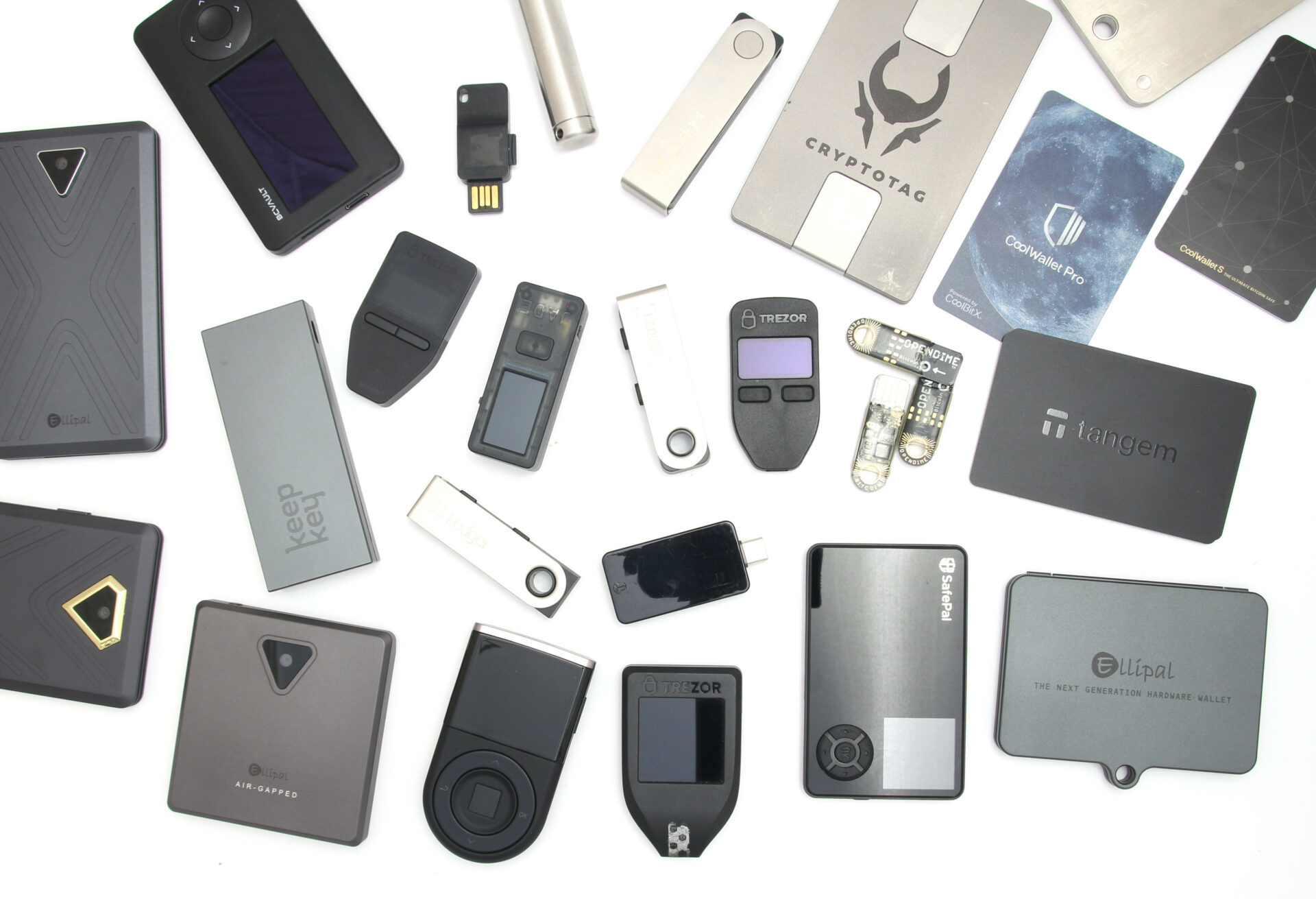
In the evolving world of cryptocurrency, the security of digital assets remains a paramount concern.The choice between hardware and software wallets continues to be a critical decision for both seasoned investors and newcomers alike. Whether you prioritize top-notch security or the convenience of quick transactions, understanding the nuances of these storage solutions is essential in the dynamic realm of digital finance.
What are crypto wallets?
A crypto wallet is a digital tool that allows users to store, send, and receive cryptocurrencies like Bitcoin, Ethereum, and many others. Despite its name, a crypto wallet doesn't store cryptocurrencies directly; instead, it holds the cryptographic keys—both public and private—that provide access to one's digital assets and enable transactions.
- The Public Key. This acts much like a bank account number. It’s what you share with others to receive funds.
- The Private Key. This is akin to an ATM PIN and should be kept secret. It gives you access to your cryptocurrencies and the power to execute transactions.
Hardware wallet

A hardware wallet is a specialized device designed to secure cryptocurrency holdings. Unlike software wallets, which are programs installed on computers or smartphones, hardware wallets store the user's private keys in a secure hardware device, making them highly resistant to computer viruses and online attacks. This distinct feature addresses a core need among cryptocurrency users: enhanced security for their digital assets.
Hardware wallets resemble small portable devices, often looking similar to a USB stick. They are built to be compact and easy to carry, allowing users to manage their cryptocurrencies on the go. The device itself is typically equipped with a small screen to display transaction details for verification purposes, and buttons that the user must physically press to confirm transactions, thereby adding an additional layer of security by requiring manual interaction.
The primary appeal of hardware wallets lies in their security. The private keys, which are crucial for accessing and transacting cryptocurrencies, never leave the device. When a transaction is made, it is signed within the device and then sent to the blockchain network. This closed-circuit process significantly reduces the risk of the keys being intercepted by malware or hackers.
Furthermore, most hardware wallets are built to be immune to physical damage, meaning that they can retain data even under extreme conditions. They also often feature a pin code protection that prevents unauthorized access, and the ability to set up a recovery phrase. This recovery phrase is a series of words generated when setting up the wallet which can be used to recover the funds if the device is lost or damaged.
Popular hardware wallets
Ledger has established a solid reputation for its secure hardware wallets, notably the Ledger Nano X. This device utilizes smart card technology for encryption, ensuring that your digital assets are stored with high security. Users benefit from features like backup capabilities, which allow for the secure restoration of data without physical documents. Additionally, the Ledger Nano X supports paperless remote login and secure PIN entry, along with remote password protection, enhancing both convenience and security.
Despite its strengths, Ledger has some limitations, particularly in its interaction with decentralized applications (DApps). While the hardware itself provides exemplary storage, users looking to frequently interact with DApps may find the Ledger's capabilities somewhat restricted. Nevertheless, for those primarily concerned with security and less so with DApp interaction, Ledger offers a robust solution.
Trezor is another key player in the hardware wallet market, known for its high-end security features. Unlike Ledger, Trezor does not currently offer a mobile app, but it compensates with a unique application for smartwatches, extending its usability in innovative ways. Trezor wallets are praised for their impressive seed phrase functionality, which is critical for the recovery of digital assets in case the device is lost or compromised. The wallets are also open-source, allowing for community contributions to their security and functionality.
However, Trezor does have some drawbacks. It offers limited support for iOS devices and various browsers, which might inconvenience users who rely on these platforms. The absence of a smartphone app can also be a limitation for users who prefer managing their cryptocurrencies on the go.
Software wallet

A software wallet is a digital application that facilitates the storage, sending, and receiving of cryptocurrencies. Designed to operate on smartphones, tablets, or computers, these wallets serve as a user-friendly gateway to the world of digital currencies, offering both convenience and functionality. In contrast to hardware wallets, which are physical devices, software wallets are easily accessible and often free, making them a popular choice for everyday transactions and new cryptocurrency users.
Software wallets function by storing private keys on your device, offering immediate access to your cryptocurrencies. This setup enables quick transactions, which can be vital for trading and daily spending. Most software wallets are equipped with intuitive interfaces that simplify the process of managing digital assets, making them accessible even to those new to cryptocurrencies.
While software wallets provide convenience, they do face potential security risks since they are connected to the internet. To mitigate these risks, reputable software wallets incorporate various security measures:
- Encryption. Encrypting the wallet with a strong password is crucial. This adds a layer of security against hacking.
- Two-Factor Authentication (2FA). Many wallets require a second form of verification before accessing the wallet or confirming transactions, enhancing security.
- Regular updates. Developers continually update wallet software to fix vulnerabilities and enhance security features.
Software wallets come in several forms, each offering different balances of security and convenience:
- Desktop wallets. Installed on personal computers, they offer control and security but are only as secure as the computer they reside on.
- Mobile wallets. These are apps installed on smartphones, making them extremely convenient for paying in physical stores or on the move using QR codes.
- Web wallets. Accessed through web browsers, they are the most convenient but also potentially the least secure, as they rely heavily on third-party services.
Popular software wallets
MetaMask is renowned for its role in the decentralized finance (DeFi) sector and its support for non-fungible tokens (NFTs). Available both as a browser extension and a mobile app for iOS and Android devices, MetaMask facilitates seamless interaction with the Ethereum blockchain and other compatible networks. Users appreciate its straightforward interface which provides direct control over transactions and funds stored locally. As a bridge to the burgeoning world of DeFi and digital collectibles, MetaMask not only simplifies management of digital assets but also enhances the user experience with secure and direct blockchain interactions.
Trust Wallet is a noncustodial wallet that emphasizes ease of use with its intuitive design, enabling users to perform a variety of operations from a single platform. It supports an extensive array of more than 100 fiat currencies for crypto purchases and integrates a staking feature, allowing users to earn interest on their cryptocurrencies. This wallet is designed for those who value a comprehensive, all-in-one tool for their crypto transactions and investment strategies. However, while Trust Wallet offers robust features, it lacks direct customer support, relying instead on a ticket-based system for resolving specific user issues.
Electrum is a dedicated Bitcoin-only wallet, known for its compatibility with various hardware wallets, including Ledger, Trezor, and KeepKey. As an open-source desktop wallet, Electrum allows tech-savvy users the flexibility to modify and enhance the software according to their needs. Its focus on Bitcoin ensures that users receive specialized features tailored for security and efficiency in Bitcoin transactions. Despite its limited support for altcoins, Electrum's emphasis on security and transparency makes it a preferred choice for Bitcoin enthusiasts. However, similar to Trust Wallet, Electrum's lack of direct customer support means users often need to rely on online documentation for help.
Key differences between hardware and software wallets

Both hardware and software wallets offer unique advantages and cater to different needs depending on security, accessibility, and overall user experience.
Storage
Hardware wallets store private keys offline on a physical device, making them less susceptible to online hacks and unauthorized access. This method, known as cold storage, is particularly favored for its enhanced security.
Software wallets, on the other hand, are digital apps that keep private keys on a device that may be connected to the internet (hot storage). While they offer quicker access, they are potentially vulnerable to online threats such as malware and phishing attacks.
Security
Hardware wallets are designed with robust security measures. Because the private keys do not come into contact with your internet-enabled devices or network, they remain protected from online vulnerabilities.
Security for software wallets depends heavily on the user’s overall digital security habits and the security measures implemented by the wallet provider, like strong encryption and two-factor authentication.
Accessibility
While offering top-notch security, hardware wallets are less convenient in terms of accessibility. Transactions require the device to be physically connected to a computer or smartphone, making quick transactions more cumbersome.
Software wallets shine in accessibility, as they allow users to send and receive cryptocurrencies quickly and easily from anywhere, using a computer or a mobile device.
Password recovery
If you forget your pin or lose your hardware wallet, recovering your funds can be done through a backup passphrase created during the initial setup of the device.
Typically, to restore access to a software wallet, you would use either a passphrase or email verification as a recovery method, which varies based on the specific design of the wallet.
User interface
Generally feature a simple interface with limited interaction required. The hardware wallet might have a small screen for verifying transactions and buttons to confirm actions manually.
Software wallets often boast more intuitive and feature-rich interfaces, providing detailed information about transaction history, asset balances, and easy integration with various blockchain services.
Support for digital assets
Most hardware wallets support a wide range of cryptocurrencies, making them versatile for users who hold multiple types of assets.
The support varies significantly depending on the software wallet; some may only support a handful of cryptocurrencies, while others might allow the management of a diverse portfolio, including newer or less common assets.
Cost
Hardware wallets require an upfront purchase, typically ranging from $50 to $150, which may be a barrier for those just starting with cryptocurrencies.
Most software wallets are free to download and use, which makes them more accessible for new users and those not wanting to invest in hardware.
Drawbacks of hardware wallet

Loss or physical damage
One of the primary risks associated with hardware wallets is the physical loss or damage of the device. Such events can lead to the irreversible loss of access to stored cryptocurrencies unless proper backup measures are in place. It is crucial for users to maintain a secure backup of their private keys, typically in the form of a recovery phrase, to restore access to their funds if their hardware wallet is lost, stolen, or damaged.
Vulnerability to phishing and scams
Despite the high level of technical security of hardware wallets, they do not protect against social engineering attacks such as phishing. Users can be deceived into providing their seed phrases or other critical security information to impostors posing as legitimate support personnel. This type of scam can lead to the complete loss of digital assets.
Risks from malware
While hardware wallets are designed to securely isolate private keys from online threats, they interact with other devices like computers or smartphones, which can be compromised. Malware on these devices can manipulate cryptocurrency transactions by changing the recipient addresses during the transaction process. Consequently, even if the private keys remain secure, the assets can still be redirected to an attacker’s address without the user’s knowledge until it is too late.
Danger of counterfeit wallets
The market for hardware wallets is not immune to the presence of counterfeit or tampered devices. These modified wallets can compromise the user's private keys and steal funds directly. Therefore, purchasing hardware wallets from reputable sources and avoiding second-hand or unverified sellers is imperative. Users should always acquire hardware wallets directly from the manufacturer or authorized retailers to avoid the risk of buying a compromised device.
Drawbacks of software wallet

Vulnerability of online keys
A significant risk with software wallets is that they store your cryptographic keys in your device's browser or app data store. Since these storage locations are continuously connected to the internet, they are susceptible to cyberattacks. Hackers can exploit security flaws to access these keys, potentially leading to the theft of your digital assets. This constant online presence requires stringent security measures to protect against unauthorized access.
Transaction security
Another concern with software wallets is the security of transactions. When you initiate a transaction, the details appear on your device's screen for you to approve and sign cryptographically. However, devices such as desktops and smartphones are vulnerable to malware and other forms of cyberattacks that can alter the display information. This manipulation can lead you to unknowingly sign off on fraudulent or malicious transactions.
App vulnerabilities
Software wallets, particularly those that are custodial, can have vulnerabilities inherent in the application itself. Hackers can exploit these weaknesses to gain unauthorized access to users’ digital funds. Web-based wallets are especially vulnerable if they do not implement robust security protocols. The responsibility to secure these wallets not only falls on the developers but also on users to regularly update their applications and maintain good cybersecurity practices.
Conclusion
The decision to use a hardware or software wallet depends on individual needs and priorities. Hardware wallets offer unparalleled security by keeping cryptographic keys offline, ideal for those storing large sums over the long term, though they come at a higher cost and with less convenience. Software wallets, conversely, provide easy access and quick transactions, making them suitable for daily use and frequent trading, all at little to no cost. Ultimately, whether securing substantial investments with a hardware wallet or enjoying the accessibility of a software wallet, users must weigh their specific requirements to find the best fit for managing their digital assets.




Comments 0